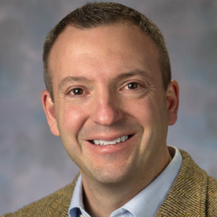




Jean Farup did his graduate studies in human exercise physiology at Dept of Public Health Aarhus University from which he obtained his PhD in stem cell physiology in 2014. He then continued into a postdoc position at Dept of Clinical Medicine, Aarhus University, and later joined the lab of Thomas Rando at Stanford University. During this time, he studied muscle stem cell quiescence and the role of the muscle microenvironment in chronic diseases such as type 2 diabetes. In 2019 he joined the Dept of Biomedicine at Aarhus University as an assistant professor where he has been establishing a research group focusing on the muscle microenvironment in human skeletal muscle. His work focuses on the fibro-adipogenic progenitors (FAPs) and their role in maintenance and degeneration in human skeletal muscle. Most recently, his work has highlighted the important role of FAP subsets in human skeletal muscle during chronic muscle degeneration. Current studies focus on the cross-talk between FAPs and macrophages and the role for FAPs in regulating immune cell infiltration and local tissue inflammation in human muscle.
Scott Harper, PhD, is a Principal Investigator in the Center for Gene Therapy at the Abigail Wexner Research Institute at Nationwide Children’s Hospital and a Professor of Pediatrics at the Ohio State University College of Medicine. In addition to his primary academic positions, Dr. Harper serves as Chief Scientific Adviser at Armatus Bio, a gene therapy startup company in Columbus, Ohio. Dr. Harper is also a member of the Scientific Advisory Boards of the Charcot-Marie-Tooth Association (CMTA) and Andelyn Biosciences, and a standing member of the NIH Neurological Sciences and Disorders B (NSD-B) study section.
Dr. Harper earned a PhD in Cellular and Molecular Biology from the University of Michigan Medical School, where he worked in the lab of Dr. Jeff Chamberlain to develop the first generation of micro-dystrophin gene therapies for Duchenne Muscular Dystrophy (DMD). He then completed postdoctoral training in the lab of Beverly Davidson, PhD, at the University of Iowa, where he developed gene therapies to treat dominant neurodegenerative diseases, including Huntington’s Disease.
Dr. Harper’s primary research focus at Nationwide Children's has been developing gene therapies to treat neuromuscular and neurological disorders, including FSHD. He was recipient of the 2014 “Outstanding New Investigator” Award from the American Society of Gene and Cell Therapy.
Dr. Millay has a long-standing interest in various aspects of skeletal muscle biology. His training has integrated several research areas including molecular, cellular, and developmental biology, and biochemistry. The Millay laboratory at Cincinnati Children’s Hospital Medical Center aims to identify the factors that regulate cell-cell fusion, using skeletal muscle as a model system, delineate their biochemical functions and the biophysical properties associated with membrane coalescence, and then ultimately translate that information to augment pathological conditions. He discovered the muscle-specific proteins (Myomaker and Myomerger) that are necessary and sufficient for myoblast fusion. The group has a wide-range of projects that encompass basic and translational biology related to these fusogens and the consequences of fusion, namely multinucleation that controls muscle development and adaptations. The basic science projects in the laboratory are attempting to biochemically elucidate the activities of Myomaker and Myomerger, which would allow for a complete understanding of the mammalian myoblast fusion reaction through biochemical and cell biological approaches. Additionally, the lab is interested in understanding the role of the hundreds of myonculei within the muscle syncytium. For this research area, they generated mouse models where the number of myonuclei are titrated and also performed transcriptional profiling of myonuclei from mice. They developed a publicly searchable site (https://research.cchmc.org/myoatlas/) where users can determine expression of genes within myonuclei across the lifespan of the mouse. Our goal here is to understand the role of muscle stem cell fusion during various phases of muscle development, growth, and disease. Finally, the translational work relates to transferring the function of Myomaker and Myomerger onto various membrane vectors to enhance delivery of therapeutic material to skeletal muscle.
Chiara Mozzetta is a researcher and Group Leader at Institute of Molecular Biology and Pathology (IBPM) of the National Research Council of Italy, located at University Sapienza of Rome. The major focus of the Mozzetta lab is to study how histone modifying enzymes control stem cell’s fate plasticity by shaping three-dimensional genome organization, with the goal to understand how this contributes to stem cells’ lineage restriction. Particularly, the Mozzetta lab is currently devoting its efforts in deciphering how heterochromatin is dynamically re-shaped to coordinate cell-type specific gene expression patterns to establish and maintain cell identity during tissue regeneration, aging and disease. Because a causal link between changes in genome architecture and pathological de-regulation of transcriptional control is emerging, the Mozzetta lab aims to study how, and to what extent, these processes are altered in muscle disorders, such as muscular dystrophies and malignancies of muscular origin. Since chromatin modifying enzymes offer a reservoir of possible druggable targets, the research team of the Mozzetta lab anticipates that expanding the knowledge on the epigenetic mechanisms dictating stem cells fate decisions will contribute to develop next-generation selective approaches to modulate their developmental capacities therapeutically.